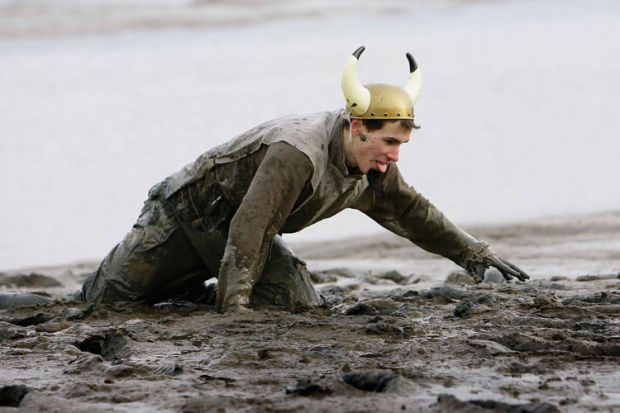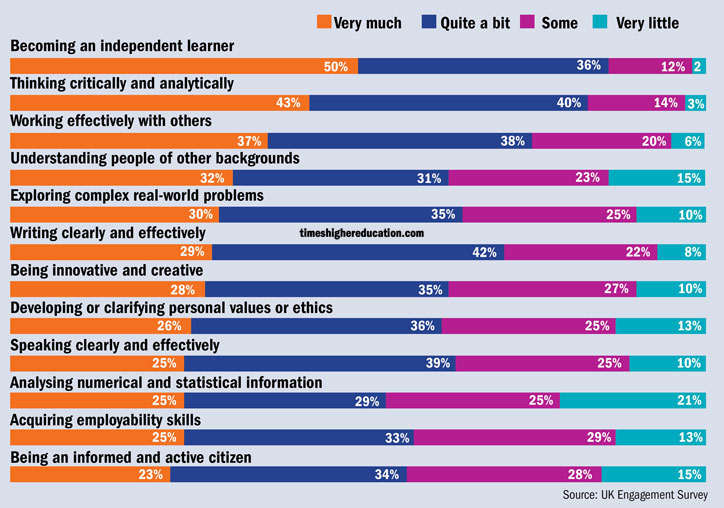Undergraduates report little significant improvement in “soft” skills such as creativity and citizenship over the course of their university careers, according to a major survey that could form part of the teaching excellence framework.
The Higher Education Academy’s UK Engagement Survey, based on North America’s National Survey of Student Engagement, draws on the responses of more than 24,000 undergraduates and is the first nationwide attempt to measure “learning gain” in British universities.
The first formal results, released exclusively to Times Higher Education, reveal that students perceived strong development of “hard” skills, which are traditionally regarded as a hallmark of university study.
Half of all respondents reported very high levels of development in becoming an independent learner, with another 36 per cent saying that they experienced a reasonable amount of development. Eighty-three per cent reported a very high or reasonable amount of development in critical and analytical thinking skills.
In contrast, only about a quarter of undergraduates perceived a very high level of benefit to softer skills such as citizenship, innovation and developing personal values.
The responses were similar for employability skills and the ability to analyse numerical and statistical information, another key demand of businesses. More than one in five respondents reported very little development in the latter, although there were significant differences by subject studied.
In general, students studying science, technology, engineering and mathematics-based subjects reported significantly higher gains in hard skills than in soft skills, while undergraduates following arts and humanities courses perceived significantly lower levels of hard skill development than their counterparts in other subject areas.
Significantly, although the responses of students in different years indicated progressive development of hard skills over the course of a three-year degree, no such pattern was evident in soft skills: the responses of third-year students were almost identical to those of first years in most subject areas.
Sue Rigby, deputy vice-chancellor for student development at the University of Lincoln, who chairs the HEA’s surveys steering group and the work on learning gain being coordinated by the Higher Education Funding Council for England, said that the UKES demonstrated that development of soft skills needed to be integrated into curricula more explicitly.
How much has overall student experience contributed in following areas?
“All universities will want their students to leave with all the soft skills that kit them out for the next thing in life so the survey is really useful, showing that, particularly in STEM subjects, students are not rating themselves highly in terms of developing soft skills,” Professor Rigby said. “It gives universities another way of looking at what they are doing and an opportunity to rebalance some of the things they are talking to students about: it is worth spending time on this stuff.”
Further questions identified the pedagogical approaches that were felt to be most beneficial for skill development, including, for hard skills, engagement with research; and for soft skills, reflective and integrative learning.
Twenty-four institutions participated in the UKES this year, and THE understands that ministers are interested in looking at the results for later stages of the TEF, which will introduce differentiated fee caps for English universities based on their performance.
US research indicates that engagement is a better proxy for learning gain than satisfaction, another proposed TEF metric.
“You could be happy and not learn much,” Professor Rigby said. “You could be engaged and not learn much, but it’s less likely.”
If the survey does form part of the TEF, one set of findings that could prove particularly powerful are those around the perceptions of learning gain expressed by students from different types of universities.
Undergraduates reported similar levels of hard skill development whether they attended a pre-92 institution or a post-92. Moreover, students at newer universities reported “markedly higher” levels of soft skill growth than their counterparts at older institutions, which are traditionally regarded as being more prestigious.
But Camille Kandiko Howson, a senior lecturer in higher education at King’s College London who worked on the UKES, said that the difference in responses by discipline meant that this was where the survey was most valuable.
“For things like the TEF to be useful, this information would need to be reported and analysed at subject level,” she said. “You could get an institutional average from that but, if you were comparing institutions, you would basically be comparing groups of students they have in different disciplines.”
后记
Print headline: Degrees failing to boost students’ ‘soft skills’
请先注册再继续
为何要注册?
- 注册是免费的,而且十分便捷
- 注册成功后,您每月可免费阅读3篇文章
- 订阅我们的邮件
已经注册或者是已订阅?


